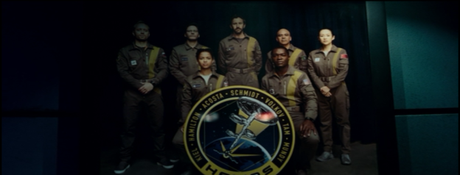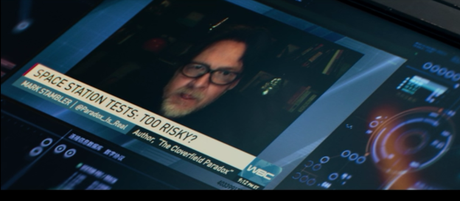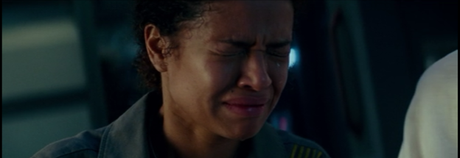In the here and now, The Cloverfield Paradox is more a thinkpiece generator than mere movie. A studio-produced, mid-budget sci-fi movie from a black director (Julius Onah) and starring a multi-ethnic cast (David Oyelowo, Ziyi Zhang, Daniel Bruhl, Elizabeth Debicki, Chris O'Dowd) but most notably led by a black woman (Gugu Mbatha-Raw) was just sold off to Netflix because the new boss at Paramount didn't think it qualified as a theatrical movie? Oh, fuck you, Hollywood. On top of that, Netflix debuted a 30-second teaser during the Super Bowl and then stunningly put the whole movie up for streaming after the game, breaking from years of tradition of not competing with the coveted post-Super Bowl time slot? Damn, the balls on you, Netflix. A major movie hreleased with almost no advanced press, ads, or even a full trailer? Game-changer.
However, at the center of all this is a simple sci-fi/survival horror hybrid. Before debating what Cloverfield Paradox represents there's the little matter of discussing what it is. Simply put, is Paradox a good movie?
Well...I'm still figuring out my answer to that. Truth be told, I'm writing this while watching the movie. I've never done that before, but no one's released a major Hollywood movie directly after the Super Bowl before either. So, uncharted waters here, people.
Only keep reading if you don't mind having the premise of the film spoiled.Conceived of as a side-sequel/prequel to the first Cloverfield, Paradox begins with a couple, Hamilton (Mbatha-Raw) and Michael (Roger Davies), stuck in the kind of barely moving, neverending line which once greeted all Americans at gas stations during the fuel crisis of the 70s. In their car, we overhear background radio reports referencing a worldwide energy crisis, and it turns out Hamilton is some kind of astronaut weighing whether or not to undergo a potentially lengthy mission aboard an experimental space station (called Cloverfield) which might just save the world. The station aims to use something called The Shepherd Accelerator to generate free energy for the entire globe. She's afraid to leave Michael behind for that long, but he insists that she go.

After this cold open with Hamilton and Michael, a rather slickly produced opening credits sequence depicts life aboard the Cloverfield, monitoring the international crew's continued failure as day 16 turns to 623 in a matter of minutes. The crew, led by David Oyelowo's Kiel and filled out with people whose names you'll instantly forget, is on edge. Everyone back on Earth is as well, with Russia and Germany said to be on the brink of war. The Cloverfield can only perform its Shepherd test three more times before they run of resources and return home. So, yeah, the straits, they be dire.
Now really stop reading if you don't want to know the twist even though we find out about it 20 minutes into this 101-minute movie.
Not everyone on Earth wants the crew to succeed. A scientist played by Donal Logue warns in a TV interview of something called "The Cloverfield Paradox," which he explains is the theory that since the Cloverfield station is messing around with unprecedented levels of energy it's possible they will somehow unintentionally open a universal or dimension rift.
So, of course, that's exactly what happens. The crew's latest Shepherd Accelerator test rips a hole in space, launching the Cloverfield into a different universe that looks the same but is different in small, crucial ways and opening the door for monsters to invade the Earth in their universe. The crew doesn't know that, but we do, thanks to a scene with Michael back on Earth witnessing the beginnings of the first Cloverfied's monster attack. The rest of the film is devoted to the crew searching for a way home. Shit goes wrong. People die. Parts of the station blow up. The usual, with the key difference being that there's no monster hunting after them. Indeed, the appeal of the project to the screenwriters seems to have been the potential to mash-up Alien with Event Horizon without resorting to having a monster hunting the crew.
You can start reading again to hear, more generally, what I thought of the movie.Yet it's nowhere near as fun as fun as it should be. The majority of the characters are paper thin, forgettable, and overly prone to stupid behavior. They talk almost entirely in exposition, and we never come to learn all that much about any of them, either through their words or actions (but, hey, Chris O'Dowd's genuinely funny throughout). The special effects are unremarkable. A side story back on Earth feels perfunctory. Even though there's not one but two separate scenes of a character randomly punching another character, there's precious little compelling conflict (a hint of spousal strife here, harsh words between the one Russian and one German on the crew there). Crucial action scenes notably push up against the constraints of the film's budget. Onah's direction fails to generate consistent tension, dread, or claustraphobic horror throughout, instead proving more successful in short bursts, such as one scene involving a mysterious stowaway showing up stuck inside of and partially merged with one of the Cloverfield's walls.

And the big emotional twist at the end is really just the screenwriters pulling Gravity's emotional core out of their ass and reusing it here in a way that seems better fit for a Black Mirror or Electric Dreams episode.
Yeah, but if Bright is the new standard for Netflix Original Movies is Cloverfield Paradox at least fun, even if in a deeply stupid-fun kind of way?
Not really. This isn't an epically terrible, borderline offensive "WTF were they thinking remaking End of Line and Alien Nation with Orcs?" movie the way Bright is; this is just a mediocre movie. The actual twist is executed quite effectively, and since she's ultimately the only character the film cares about Mbatha-Raw's Hamilton enjoys an adequate arc. Really, though, the whole thing is merely adequate. I can see why Paramount gave up on it.
THE BOTTOM LINEWith each new Cloverfield movie, J.J. Abrams and Bad Robot tackle a different genre. Paradox is clearly their space/horror survival flick. However, it doesn't do its genre justice, not the way Cloverfield did for the monster movie and 10 Cloverfield Lane did for the single-setting psychological thriller/ Twilight Zon e drama.
RANDOM PARTING THOUGHT- "Bad things are happening, but good people are gonna make it better." / "Well, we're gonna need a lot of good people."
- The trajectory of the franchise seems to be examining what happens to the people on the ground when an unexplained monster attack begins (Cloverfield), what happens to a woman who wakes up after the attack in an underground bunker with a crazy man (10 Cloverfield Lane), and what happened up on the space station that inadvertently caused all of this in the first place (Cloverfield Paradox). Where will they take it next?

